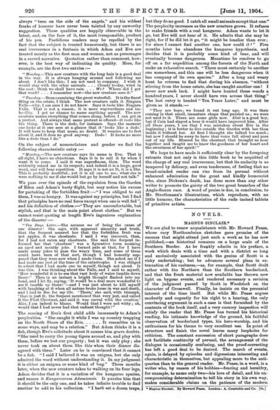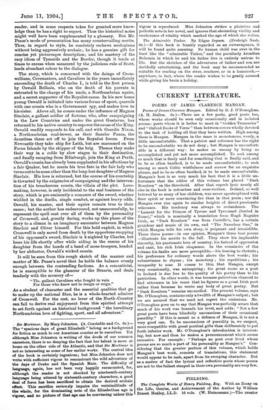MAGNUS SINCLAIR.*
WE are glad to renew acquaintance with Mr. Howard Pease, whose racy Northumbrian sketches gave promise of the success that might attend just such a work as he has now published,—an historical romance on a large scale of the Southern Border. As he frankly admits in his preface, a work which deals with a time and with a district so long and exclusively associated with the genius of Scott is a risky undertaking ; but he advances several pleas in ex- tenuation of his rashness,—as, for example, that Scott dealt rather with the Northern than the Southern borderland, and that the fresh material now available has thrown new light on bygone events, and rendered necessary a revision of the judgment passed by Scott in Woodstock on the character of Cromwell. Finally, he insists on the perennial interest of the time itself. But while Mr. Pease argues modestly and cogently for his right to a hearing, the only convincing argument in such a case is that furnished by the contents of the book itself, and a very cursory inspection will satisfy the reader that Mr. Pease has turned his historical reading, his intimate knowledge of the ground, his faithful observation of borderland types, his hero-worship, and his enthusiasm for his theme to very excellent use. In point of structure and finish the novel leaves many loopholes for criticism. The constant succession of short paragraphs does not facilitate continuity of perusal, the arrangement of the dialogue is occasionally confusing, and the proof-correcting has left a good deal to be desired. The march of events, again, is delayed by episodes and digressions interesting and characteristic in themselves, but appealing more to the anti- quarian than to the general reader. Mr. Pease, in a word, is a writer who, by reason of his hobbies—fencing and heraldry, for example, to name only two—his love of detail, and his un- compromising determination to tell his story in his own way, makes considerable claims on the patience of the modern * Main= Sinclair. By Howard Pease. London : A. Constable and Co. [613.1
reader, and in some respects takes for granted more know- ledge than be has a right to expect. Thus the historical notes might well have been supplemented by a glossary. But Mr. Pease's mode of presentation has many countervailing merits. Thus, in regard to style, he resolutely eschews neologisms without being aggressively archaic ; he has a genuine gift for concise yet picturesque description; and his mastery of the racy idiom of Tyneside and the Border, though it tends at times to excess when measured by the judicious rule of Scott, lends abundant colour to the dialogue.
The story, which is concerned with the doings of Crom- wellians, Covenanters, and Cavaliers in the years immediately succeeding the death of Charles I., is told in the first person by Oswald Bellaeis, who on the death of his parents is entrusted to the charge of his uncle, a Northumbrian squire, and a secret supporter of the Royalist cause. In his new home young Oswald is initiated into various forms of sport, quarrels with one cousin who is a Government spy, and makes love to his sister. Above all, he comes under the influence of Magnus Sinclair, a gallant soldier of fortune, who, after campaigning in the Low Countries and under the great Gustavus, has returned to his native country to espouse the cause of the King. Oswald readily responds to his call, and with Geordie Nixon, a Northumbrian coal-hewer, as their Sancho Panza, the dauntless three set off to join the Royalist forces. From Newcastle they take ship for Leith, but are marooned on the Fame Islands by the skipper of the brig. Thence they make their way in a coble by slow stages to their destination, and finally escaping from Edinburgh, join the King at Perth. Oswald's cousin has already been supplanted in his affections by a fair Quaker, but he meets his true fate in the fair lady who turns out to be none other than the long-lost daughter of Magnus Sinclair. His love is returned, but the course of his courtship is thwarted by the exigencies of campaigning and the interven- tion of his treacherous cousin, the villain of the plot. Love- making, however, is only incidental to the real business of the story, which is pre-eminently a romanee of the sword, whether wielded in the duello, single combat, or against heavy odds. Oswald, his master, and their squire remain true to their cause; but the author has endeavoured, not unsuccessfully, to represent the spell cast over all of them by the personality of Cromwell, and, greatly daring, works up this phase of the story to a climax in an imaginary encounter between Magnus Sinclair and Oliver himself. For this bold exploit, in which Cromwell is only saved from death by the opportune snapping of his opponent's sword, Sinclair is knighted by Charles, but loses his life shortly after while aiding in the rescue of his daughter from the hands of a band of moss-troopers, headed
by her abductor, Oswald's wicked cousin.
It will be seen from this rough sketch of the manner and matter of Mr. Pease's novel that he holds the balance evenly enough between the contending factions. As a romanticist, he is susceptible to the glamour of the Stuarts, and deals tenderly with the memory of- " Tht. gallant Cavaliers who fought in vain
For those who knew not to resign or reign."
As a student of character and the essential qualities that go to make up the national fibre, he is a whole-hearted admirer of Cromwell. For the red, no lover of the North -Country can fail to derive real enjoyment from this spirited attempt to set forth against an historical background "the hereditary Northumbrian love of fighting, sport, and all adventure."











































 Previous page
Previous page